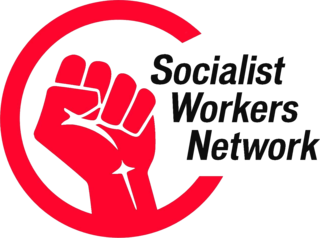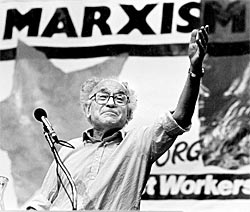Paul Mackintosh Foot was a British investigative journalist, political campaigner, author, and long-time member of the Socialist Workers Party (SWP).

Alexander Theodore Callinicos is a Rhodesian-born British political theorist and activist. An adherent of Trotskyism, he is a member of the Central Committee of the Socialist Workers Party (SWP) and serves as its International Secretary. Between 2009 and 2020 he was the editor of International Socialism, the SWP's theoretical journal, and has published a number of books.
Duncan Hallas, was a prominent member of the Trotskyist movement and a leading member of the Socialist Workers Party in Great Britain.

Lindsey Ann German is a British left-wing political activist. A founding member and convenor of the British anti-war organisation Stop the War Coalition, she was formerly a member of the Socialist Workers Party, sitting on its central committee and editor of its magazine, Socialist Review.

The Socialist Review was a monthly magazine of the British Socialist Workers Party. As well as being printed it is also published online.
The Revolutionary Workers League was a Canadian Trostkyist party formed on 8 August 1977 by the fusion of the Revolutionary Marxist Group and its Quebec counterpart, the Groupe Marxiste Revolutionnaire, with the League for Socialist Action. The organization marked the reunification of the Canadian section of the Fourth International and had a membership of several hundred people. The group published a monthly newspaper in English, Socialist Voice, as well as a French-language publication, La Lutte Ouvrière.

The Socialist Workers Network (SWN) is an Irish Trotskyist organisation.

The International Socialist Review was a monthly magazine published in Chicago, Illinois by Charles H. Kerr & Co. from 1900 until 1918. The magazine was chiefly a Marxist theoretical journal during its first years under the editorship of A.M. Simons. Beginning in 1908 the publication took a turn to the left with publisher Charles H. Kerr taking over the main editorial task. The later Review featured heavy use of photographic illustration on glossy paper and mixed news of the contemporary labor movement with its typical theoretical fare.
During the nine decades since its establishment in 1919, the Communist Party USA produced or inspired a vast array of newspapers and magazines in at least 25 different languages. This list of the Non-English press of the Communist Party USA provides basic information on each title, along with links to pages dealing with specific publications in greater depth.

For a number of decades after its establishment in August 1901, the Socialist Party of America produced or inspired a vast array of newspapers and magazines in an array different languages. This list of the Non-English press of the Socialist Party of America provides basic information on each title, along with links to pages dealing with specific publications in greater depth.

The International Socialist Group was a revolutionary socialist organisation based in Scotland which was formed in April 2011 by former members of the Socialist Workers Party. The group produced a free monthly broadsheet and online blog, Communiqué. The ISG participated in a number of campaigns, such as the Coalition of Resistance, Stop the War Coalition and the Radical Independence Campaign. In 2015 the ISG formally dissolved with its members participating in the Scottish Left Project, the organisational process which led to the RISE electoral alliance to contest the 2016 Scottish Parliamentary elections alongside Scottish Socialist Party, individuals from the Radical Independence Campaign and other activists and trade unionists.

Christopher John Harman was a British journalist and political activist, and a member of the Central Committee of the Socialist Workers Party. He was an editor of International Socialism and Socialist Worker.

The International Socialist Organization (ISO) was a Trotskyist group active primarily on college campuses in the United States that was founded in 1976 and dissolved in 2019. The organization held Leninist positions on imperialism and the role of a vanguard party. However, it did not believe that necessary conditions for a revolutionary party in the United States were met; ISO believed that it was preparing the ground for such a party. The organization held a Trotskyist critique of nominally socialist states, which it considered class societies. In contrast, the organization advocated the tradition of "socialism from below." as articulated by Hal Draper. Initially founded as a section of the International Socialist Tendency (IST), it was strongly influenced by the perspectives of Draper and Tony Cliff of the British Socialist Workers Party. It broke from the IST in 2001, but continued to exist as an independent organization for the next eighteen years. The organization advocated independence from the U.S. two-party system and sometimes supported electoral strategies by outside parties, especially the Green Party of the United States.

The Socialist Workers Party (SWP) is a far-left political party in the United Kingdom. Founded as the Socialist Review Group by supporters of Tony Cliff in 1950, it became the International Socialists in 1962 and the SWP in 1977. The party considers itself to be Trotskyist. Cliff and his followers criticised the Soviet Union and its satellites, calling them state capitalist rather than socialist countries.

Charles "Charlie" Nicholas Kimber is the National Secretary of the Socialist Workers Party of the United Kingdom from January 2011.
Martin James Smith is a British political activist. He is a former National Secretary of the Socialist Workers Party (SWP), a position he held from 2004 until January 2011. He is reported to have left the SWP in 2013 following accusations of the rape of a much younger female member of the party.

Tony Cliff was a Trotskyist activist. Born to a Jewish family in Ottoman Palestine, he moved to Britain in 1947 and by the end of the 1950s had assumed the pen name of Tony Cliff. A founding member of the Socialist Review Group, which became the International Socialists and then the Socialist Workers Party, in 1977. Cliff was effectively the leader of all three.
The Militant is an international socialist newsweekly connected to the Socialist Workers Party (SWP) and the Pathfinder Press. It is published in the United States and distributed in other countries such as Canada, the United Kingdom, Australia, France, Sweden, Iceland, and New Zealand.

The International Socialist Tendency (IST) is an international grouping of unorthodox Trotskyist organisations espousing the ideas of Tony Cliff (1917–2000), founder of the Socialist Workers Party (SWP) in Britain. IST supporters are sometimes called "Cliffites". It has sections across 27 countries; however, its strongest presence is in Europe, especially in Britain.

Bookmarks is Britain's largest socialist bookshop. It was founded in 1973 by the Socialist Workers Party (SWP) and is based in Bloomsbury, London. The company has published books since 1979 and is the official bookseller for the Trades Union Congress.

















